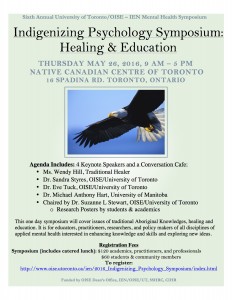Interdisciplinary Canadian Literatures in English Conference, University of Toronto (CA), May 25-27, 2017
Co-chairs: Smaro Kamboureli (University of Toronto), Larissa Lai (University of Calgary)
Canada’s Sesquicentennial anniversary of Confederation is an occasion that invites both
celebration and the need to take critical stock of how we have arrived at our particular
juncture. We currently inhabit a historical moment in which the colonial power of
English literary studies, though still present, is giving way to an English that circulates in
newly complex ways, especially in relation to global economic shifts, intensifications in
voluntary and involuntary human migration, and the rise of new or newly imagined
spiritualities and fundamentalisms. Literary study in English on that part of
Mikinaakominis (Turtle Island) that we call Canada has shifted from a colonial project
meant to build a settler nation to a project that was supposed to include marginalized
others, to, more recently, a project that must reckon with Indigeneity and the politics of
land. These and other related shifts take place within a cultural field that is also changing
with historical and geopolitical circumstances. Public culture and the idea of the public
have transformed through mutations in national space, economics, climate, lands, waters,
and even the air itself. Beside the changes in public space and our conceptions of them,
literature and writing in academic institutions are also transforming in response to
institutional and governmental politics. Further, within academia the humanities are
undermined in favour of knowledge mobilization designed to serve international capital
in (seemingly) pragmatic ways. This set of issues rises beside powerful and liberatory
Indigenous cultural and political resurgences and an accompanying imperative for non-
Indigenous people—imagined variously in racial and geo-political terms—to consider
anew responsibilities, respect, and strategies of cultural engagement as well as specific
contemporary and historical relationships to Indigeneity, land and movement.
What can literature and criticism be and do under these historical and spatial
circumstances? What can decolonization mean in its cultural and socio-political valences
now? What constitutes creativity, the imagination, experimentation, community, and
embodiment at the present moment? What kinds of activist and cultural labour can
criticism and creative writing perform? What forms might such criticism and creative
writing take? This iteration of the serial TransCanada conferences invites storytellers,
poets, novelists, creative non-fiction writers, critics, interdisciplinary practitioners and
activists to enter into newly imagined and innovatively structured forms of presentation
in order to re-build a vibrant, generative, re-productive, critical and creative community,
to ask the hard questions that need to be asked now, to attempt some provisional answers,
and to make story, poem and experiment together and apart.
Keywords to be addressed:
Affect • Activism & Activism as Performance • Asianness • Avant-Garde • Balance •
Blackness • Body • Coalition • Creative & Critical Practices • Cultural Economies •
Decolonization • Diaspora • Earth/ Water/ Air/ Fire/ Metal • Experimentation &
Experimental Writing • Forms (Literary, Cultural) • Forms & Politics / Forms in Relation
to Social Practices • The Humanities in Canada • Imagination • Indigeneity • Inheritance
/ Heritage • Institution • Justice • Kinships • Land • Literature & Activism • Migration •
Nation/ Nationalisms • New Materialisms • Neo-liberalism • Post-Humanism • The
Present • The Public • Reconciliation • Redress • Refugeeness • Relation • Transatlantic •
Transnationalism • Treaties • Writing as Practice
Submission Guidelines
Please submit proposals of up to 300 words for 20-minute-long papers that address any of
the above issues. Collaborative proposals for panel sessions that break the conference
mold in interesting and generative ways, as well as proposals for stand-alone
presentations (performances, films, videos, poster presentations, and other forms of
“demonstration”) will be most welcome.
We wish to extend a special invitation to Ph.D. students for the Plenary Session
especially designed for the presentation of doctoral research projects in the field of
Canadian literary studies. Doctoral students whose dissertation projects are nearing
completion of their program and who would like to be considered for this plenary session
should submit a proposal based on their dissertation project, along with a one-page
(single-spaced) dissertation abstract. Three to five such projects will be featured in this
plenary session, while other projects will be vetted for inclusion in the concurrent panel
sessions.
Deadline for all submissions: June 30, 2016
Notification of acceptance: by September 2016
Submission address: http://tinyurl.com/Mininaak-Trans
Guidelines for submission: Please submit your abstract via email as a Word document
attachment; ensure that your name and institutional affiliation don’t appear on the
abstract document; and use TC4-2017-abstract submission as the subject heading.
Proposals for panels should include the name/s of the panel convener/s, a brief rationale,
and abstracts by no more than three presenters.
For background information about the TransCanada conferences, please visit this website.

